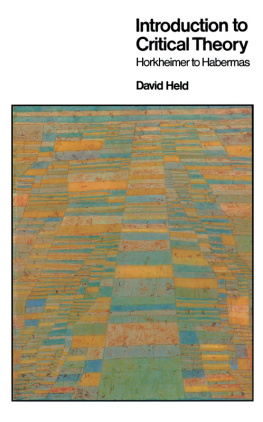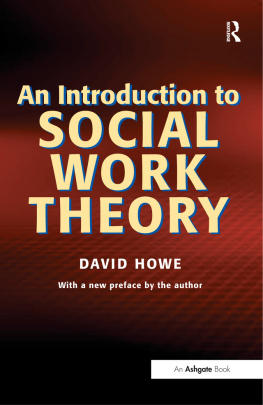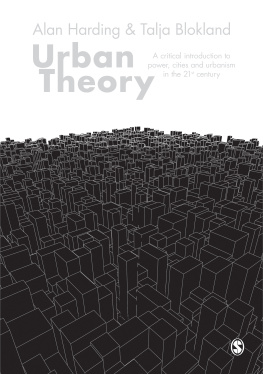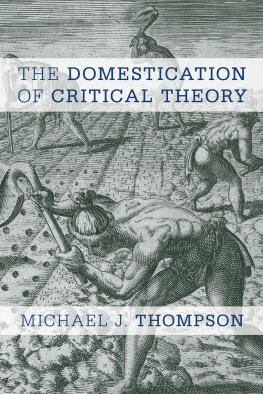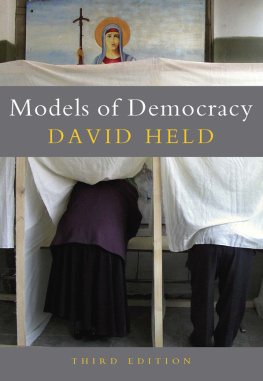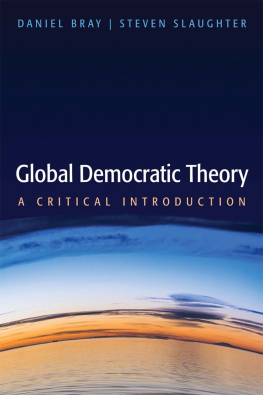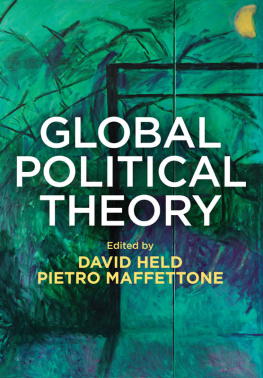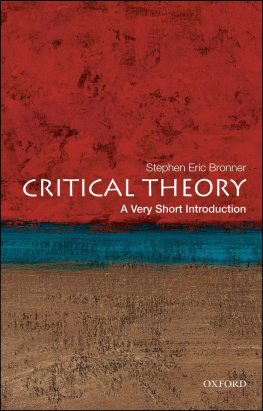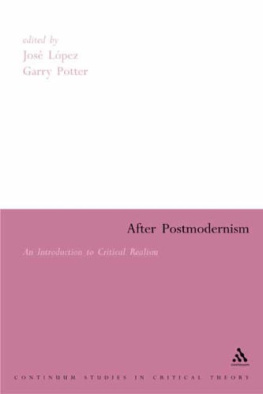David Held - Introduction to Critical Theory
Here you can read online David Held - Introduction to Critical Theory full text of the book (entire story) in english for free. Download pdf and epub, get meaning, cover and reviews about this ebook. year: 1989, publisher: BLACKWELL PUBLISHERS, genre: Politics. Description of the work, (preface) as well as reviews are available. Best literature library LitArk.com created for fans of good reading and offers a wide selection of genres:
Romance novel
Science fiction
Adventure
Detective
Science
History
Home and family
Prose
Art
Politics
Computer
Non-fiction
Religion
Business
Children
Humor
Choose a favorite category and find really read worthwhile books. Enjoy immersion in the world of imagination, feel the emotions of the characters or learn something new for yourself, make an fascinating discovery.
- Book:Introduction to Critical Theory
- Author:
- Publisher:BLACKWELL PUBLISHERS
- Genre:
- Year:1989
- Rating:4 / 5
- Favourites:Add to favourites
- Your mark:
- 80
- 1
- 2
- 3
- 4
- 5
Introduction to Critical Theory: summary, description and annotation
We offer to read an annotation, description, summary or preface (depends on what the author of the book "Introduction to Critical Theory" wrote himself). If you haven't found the necessary information about the book — write in the comments, we will try to find it.
Introduction to Critical Theory — read online for free the complete book (whole text) full work
Below is the text of the book, divided by pages. System saving the place of the last page read, allows you to conveniently read the book "Introduction to Critical Theory" online for free, without having to search again every time where you left off. Put a bookmark, and you can go to the page where you finished reading at any time.
Font size:
Interval:
Bookmark:
Introduction to Critical Theory
Horkheimer to Habermas
David Held
Polity Press
Copyright David Held 1980
First published by the University of California Press 1980.
First published in Great Britain by Hutchinson & Co. 1980.
First published by Polity Press in 1990
in association with Blackwell Publishers Ltd.
Reprinted 1990, 1995, 1997, 2004
Editorial office:
Polity Press
65 Bridge Street
Cambridge CB2 1UR, UK
Marketing and production:
Blackwell Publishers Ltd
108 Cowley Road
Oxford OX4 1JF, UK
All rights reserved. Except for the quotation of short passages for the purposes of criticism and review, no part of this publication may be reproduced, stored in a retrieval system, or transmitted, in any form or by any means, electronic, mechanical, photocopying, recording or otherwise, without the prior permission of the publisher.
Except in the United States of America, this book is sold subject to the condition that it shall not, by way of trade or otherwise, be lent, re-sold, hired out, or otherwise circulated without the publishers prior consent in any form of binding or cover other than that in which it is published and without a similar condition including this condition being imposed on the subsequent purchaser.
ISBN 978-0-7456-6839-0 (Multi-user eBook)
A CIP catalogue record for this book is available from the British Library.
Printed in Great Britain by Athenum Press Ltd, Gateshead, Tyne & Wear
This book is printed on acid-free paper.
For Peter Held
For the planning and writing of this book I am deeply indebted to Anthony Giddens. Without his generous help and criticism the quality of my work would have suffered greatly.
I would also like to express my debt to Jrgen Habermas for both the inspiration I have gained from his ideas and the time he took to answer questions.
I have, in addition, been enormously assisted by the thought and friendship of Lesley Bower, James Bradley, Paul Breines, John Forrester, Jeffrey Herf, Joel Krieger, Charles Lewis, Thomas McCarthy, Gillian Rose, James Schmidt, Larry Simon, John Thompson and Judy Wajcman. I am very grateful to Martin Albrow for his continuous concern and aid. Thanks are also due to the University of Wales, which gave me financial support while I was a Fellow of Politics and Sociology at University College, Cardiff.
Finally, my special thanks to Michelle Stanworth for her continuous help and encouragement.
I have quoted frequently from existing English translations. When the English translation is poor I have either amended it, indicating this in brackets, or re-translated it, indicating this by reference to the German text. The German text is also indicated when quotations are made from hitherto untranslated works. The initial reference to a German work is followed by a translation of its title in brackets.
The writings of what one may loosely refer to as a school of Western Marxism critical theory caught the imagination of students and intellectuals in the 1960s and early 1970s. In Germany thousands of copies of the schools work were sold, frequently in cheap pirate editions. Members of the New Left in other European countries as well as in North America were often inspired by the same sources. In other parts of the world, for example in Allendes Chile, the influence of these texts could also be detected. In the streets of Santiago, Marcuses name often took a place alongside Marx and Mao in the political slogans of the day. Critical theory became a key element in the formation and self-understanding of the New Left. Many of those committed to new radical protest movements to the struggles against imperialism, the private appropriation of scarce resources and the many constraints on personal initiative found in the works of this school an intriguing interpretation of Marxist theory and an emphasis on issues and problems (mass culture, for instance, or the family and sexuality) which had rarely been explored by more orthodox approaches to Marxism.
Despite the break-up and repression of the movements of the sixties, the writings of critical theorists have been the subject of continuing controversy controversy which has centred on their theoretical and political merits. Partly because of their rise to prominence during the political turmoil of the 1960s, and partly because they draw on traditions which are rarely studied in the Anglo-American world, the works of these authors are frequently misunderstood. Yet, in their writings, they opposed various schools of thought now being brought into disrepute (positivism, for example) and did so more cogently than many critics today. The critical theorists directed attention to areas such as the state and mass culture, areas which are only just beginning to receive the study they require. Their engagement with orthodox Marxism on the one hand, and with conventional approaches to social science on the other, provided a major challenge to writers from both perspectives. Critical of both capitalism and Soviet socialism, their writings pointed to the possibility a possibility often sought after today of an alternative path for social development.
In this book I hope to explicate and assess central aspects of critical theory. My intentions are threefold: first, to sketch the background and some of the main influences on critical theorys development; second, to expound, around a number of themes, its main theoretical and empirical concerns; third, to demonstrate and assess the assumptions and implications of the work of its key exponents. I have not written an intellectual history: this has, in part, been accomplished. Nor have I provided an account of critical theory which examines its development year by year. Clearly, one cannot entirely escape intellectual history or chronological documentation. But my emphasis is on an interpretation and elaboration of the ideas which were at the centre of the school and I have, accordingly, focused on themes the themes which gave the work its distinct character. With the exceptions of the introductory chapters to Parts 1 and 2, I have concentrated in each chapter on a key area of concern to the critical theorists.
Critical theory, it should be emphasized, does not form a unity; it does not mean the same thing to all its adherents. The tradition of thinking which can be loosely referred to by this label is divided into at least two branches the first centred around the Institute of Social Research, established in Frankfurt in 1923, and the second around the more recent work of Jrgen Habermas. The Institutes key figures were Max Horkheimer (philosopher, sociologist and social psychologist), Friedrich Pollock (economist and specialist on problems of national planning), Theodor Adorno (philosopher, sociologist, musicologist), Erich Fromm (psychoanalyst, social psychologist), Herbert Marcuse (philosopher), Franz Neumann (political scientist, with particular expertise in law), Otto Kirchheimer (political scientist, with expertise in law), Leo Lowenthal (student of popular culture and literature), Henryk Grossmann (political economist), Arkadij Gurland (economist, sociologist), and, as a member of the outer circle of the Institute, Walter Benjamin (essayist and literary critic). The Institutes When referring to the Institute of. Social Research, however, I include all those affiliated to the Institute.
Jrgen Habermass recent work in philosophy and sociology recasts the notion of critical theory. Others who have contributed to this enterprise include Albrecht Wellmer (philosopher), Claus Offe (political scientist and sociologist) and Klaus Eder (anthropologist).
Next pageFont size:
Interval:
Bookmark:
Similar books «Introduction to Critical Theory»
Look at similar books to Introduction to Critical Theory. We have selected literature similar in name and meaning in the hope of providing readers with more options to find new, interesting, not yet read works.
Discussion, reviews of the book Introduction to Critical Theory and just readers' own opinions. Leave your comments, write what you think about the work, its meaning or the main characters. Specify what exactly you liked and what you didn't like, and why you think so.

